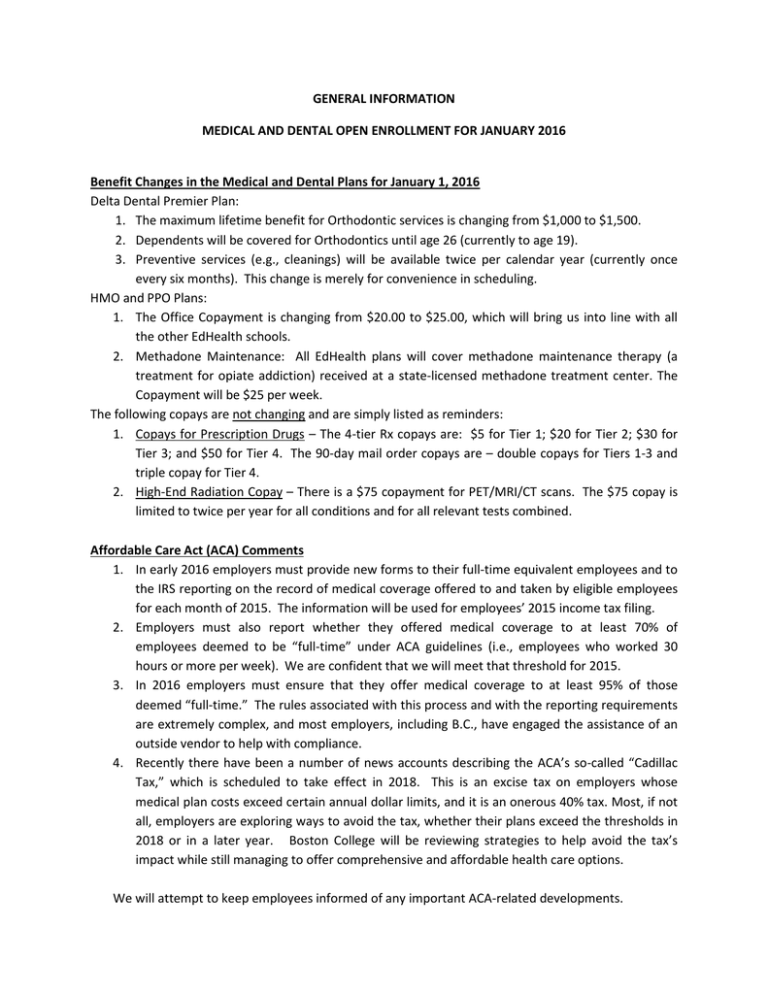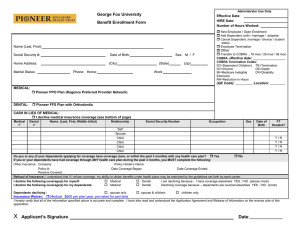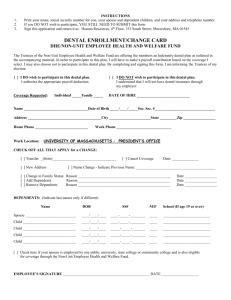GENERAL INFORMATION MEDICAL AND DENTAL OPEN ENROLLMENT FOR JANUARY 2016
advertisement

GENERAL INFORMATION MEDICAL AND DENTAL OPEN ENROLLMENT FOR JANUARY 2016 Benefit Changes in the Medical and Dental Plans for January 1, 2016 Delta Dental Premier Plan: 1. The maximum lifetime benefit for Orthodontic services is changing from $1,000 to $1,500. 2. Dependents will be covered for Orthodontics until age 26 (currently to age 19). 3. Preventive services (e.g., cleanings) will be available twice per calendar year (currently once every six months). This change is merely for convenience in scheduling. HMO and PPO Plans: 1. The Office Copayment is changing from $20.00 to $25.00, which will bring us into line with all the other EdHealth schools. 2. Methadone Maintenance: All EdHealth plans will cover methadone maintenance therapy (a treatment for opiate addiction) received at a state-licensed methadone treatment center. The Copayment will be $25 per week. The following copays are not changing and are simply listed as reminders: 1. Copays for Prescription Drugs – The 4-tier Rx copays are: $5 for Tier 1; $20 for Tier 2; $30 for Tier 3; and $50 for Tier 4. The 90-day mail order copays are – double copays for Tiers 1-3 and triple copay for Tier 4. 2. High-End Radiation Copay – There is a $75 copayment for PET/MRI/CT scans. The $75 copay is limited to twice per year for all conditions and for all relevant tests combined. Affordable Care Act (ACA) Comments 1. In early 2016 employers must provide new forms to their full-time equivalent employees and to the IRS reporting on the record of medical coverage offered to and taken by eligible employees for each month of 2015. The information will be used for employees’ 2015 income tax filing. 2. Employers must also report whether they offered medical coverage to at least 70% of employees deemed to be “full-time” under ACA guidelines (i.e., employees who worked 30 hours or more per week). We are confident that we will meet that threshold for 2015. 3. In 2016 employers must ensure that they offer medical coverage to at least 95% of those deemed “full-time.” The rules associated with this process and with the reporting requirements are extremely complex, and most employers, including B.C., have engaged the assistance of an outside vendor to help with compliance. 4. Recently there have been a number of news accounts describing the ACA’s so-called “Cadillac Tax,” which is scheduled to take effect in 2018. This is an excise tax on employers whose medical plan costs exceed certain annual dollar limits, and it is an onerous 40% tax. Most, if not all, employers are exploring ways to avoid the tax, whether their plans exceed the thresholds in 2018 or in a later year. Boston College will be reviewing strategies to help avoid the tax’s impact while still managing to offer comprehensive and affordable health care options. We will attempt to keep employees informed of any important ACA-related developments. Dependent Eligibility Audit Last year we said that our Internal Audit Department intended to conduct an audit of dependents covered under our medical and dental plans during 2015. The audit was deferred but we expect that it will be conducted in 2016. If you have family coverage under our plans, please ensure that your covered dependents comply with our plans’ dependent eligibility requirements, as stated below. Anyone who has ineligible dependents currently enrolled in the plans should take steps to remove them effective December 31, 2015, by completing the appropriate forms available online and from the Benefits Office. Removing ineligible dependents at this time will have no effect on any prior claims that were paid. Eligible dependents are: • The legal spouse of the subscriber (does not include ‘common law’ spouses). • The former spouse of the subscriber, until either party remarries. • A child (including an adopted child) of the subscriber or spouse until the child’s 26th birthday. • An unmarried child under age 19 for whom the subscriber or spouse is legal guardian. • A child age 26 or older who has been approved by Harvard Pilgrim or Delta Dental for continued coverage as a Disabled dependent under the carrier’s guidelines. • The unmarried child of an enrolled dependent. If you are unsure as to whether a current family member qualifies as a dependent, you may contact the Benefits Office for clarification or call Harvard Pilgrim’s Member Services. J:OpenEnrl:Information-OpenEnrl 2016

